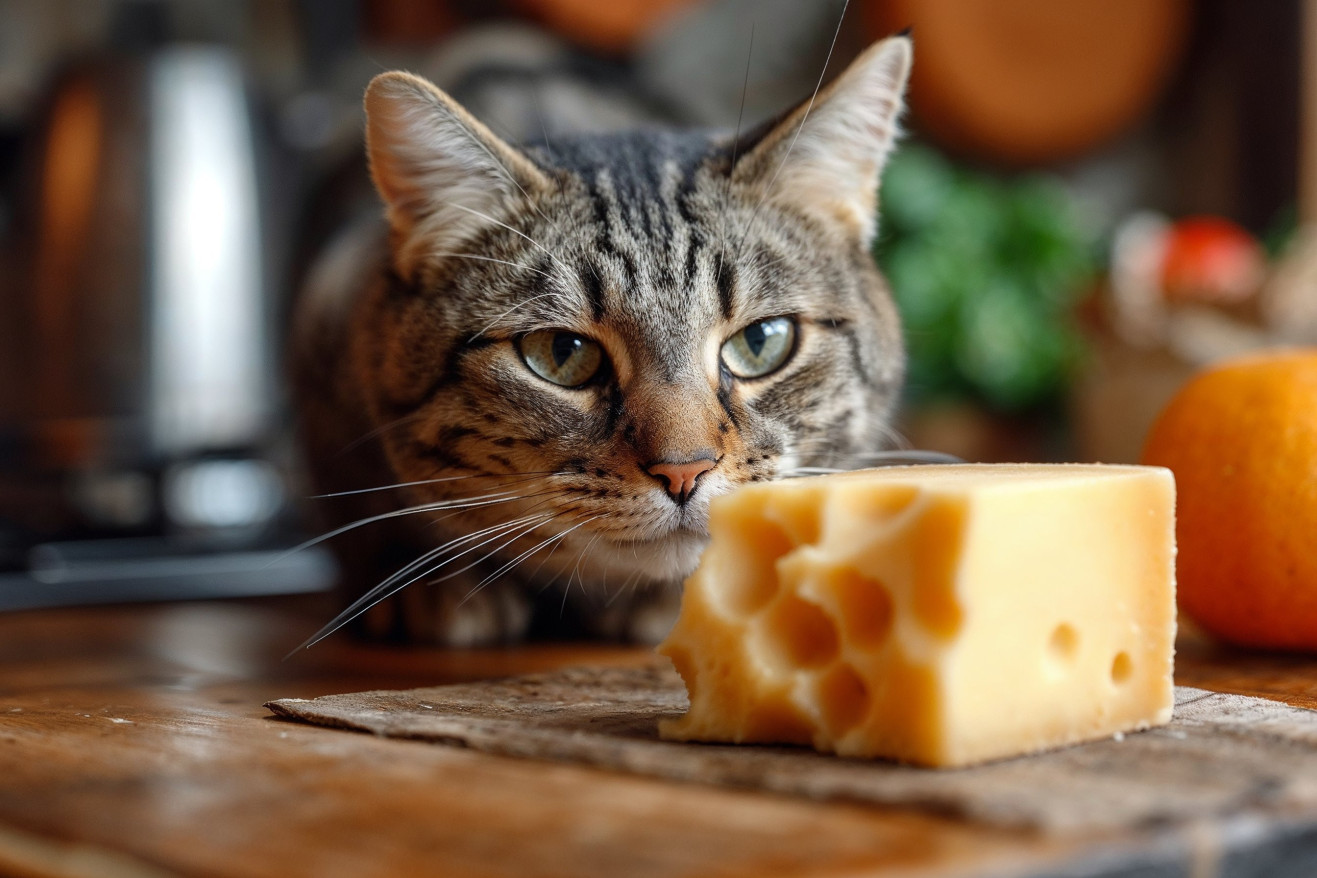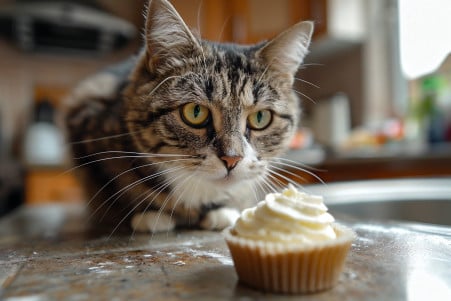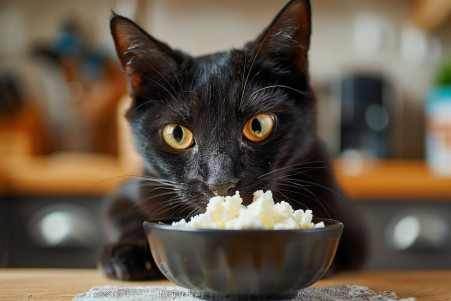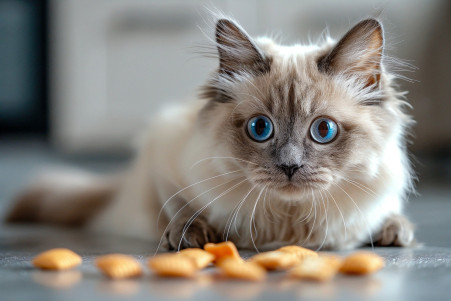Can Cats Eat Cheese? Experts Weigh In on Lactose Intolerance and Dairy
20 January 2024 • Updated 28 January 2024

It’s a dietary staple for many people, but can cats enjoy cheese, too? While cats can eat cheese in moderation, it’s not the best option for all cats. That’s because many cats are lactose intolerant, and eating cheese can cause digestive issues. If you decide to feed your cat cheese, it’s best to stick to low-lactose options like cheddar or Swiss and talk to your vet first.
In this detailed exploration of the topic, we’ll cover everything from the science behind cats’ lactose intolerance to the research on how dairy impacts cats’ health. By the end of this article, you’ll have all the information you need to decide whether or not to let your cat enjoy this popular human food.
Can cats eat cheese?
Lactose Intolerance in Cats
According to KittyBiome, lactose intolerance is one of the most common digestive problems in adult cats. This is because cats are lactose intolerant, meaning they can’t digest lactose, the sugar found in milk and dairy products.
While kittens are able to produce the lactase enzyme that’s needed to digest their mother’s milk, this ability goes away as they wean and start eating solid food, leading to lactose intolerance in adulthood.
The symptoms to watch out for are the same as in humans and include gastrointestinal problems such as gas, vomiting, or diarrhea, and they usually show up between 8 and 12 hours after the cat has consumed dairy.
The fact that the body stops producing the lactase enzyme is a natural part of the way cats’ diets change as they grow up. After all, as obligate carnivores, cats don’t have a biological need for milk, so their bodies adjust to this fact.
However, if you feed cats dairy products like cheese, you can cause the same symptoms that humans experience when they’re lactose intolerant, and it can be even more problematic for cats with certain health conditions, such as inflammatory bowel disease (IBD).
Given this, it’s important to understand whether cheese has a place in a cat’s diet and whether it’s worth the potential health risks for the temporary enjoyment of a dairy treat. After all, cats have unique dietary needs, and that means that you need to be especially careful when feeding them human food, especially if it contains lactose.
Considering the Cheese Dilemma for Cats
On the surface, cheese appears to be a healthy option for cats due to its protein and calcium content. However, the question of whether cheese is a good option for our feline friends is more complicated.
As PetMD explains, the lactose in cheese can be a problem for cats that are lactose intolerant, and hard cheeses like cheddar and Swiss have less lactose and are less likely to cause issues, while soft cheeses like mozzarella and cream cheese have more lactose and are more likely to cause problems.
In addition, the fat and sodium in cheese can be problematic for cats. According to Petco, high-fat cheeses can lead to obesity and other health problems like diabetes and heart disease in cats. In addition, cat owners need to be careful about feeding their cats high-sodium cheeses, especially if their cats have heart or kidney disease and need to eat a low-sodium diet.
While cheese can be a source of protein for cats, the fact that it has fewer health benefits for cats than other foods that meet their specific nutritional needs suggests that it should not be a regular part of their diet. Cats are obligate carnivores, which means they need a diet that’s high in animal-based protein, and cheese doesn’t provide much more than a temporary treat.
As a result, cat owners who are thinking about giving their cats cheese should make sure they’re making choices that are in line with their pets’ health needs.
Cat Nutritional Basics: Can Cats Eat Cheese?
The concept of cats as obligate carnivores is key to understanding their nutritional requirements. According to the Cornell University College of Veterinary Medicine, cats require certain nutrients that are only found in animal tissues, including high-quality proteins, essential fatty acids, vitamins, and amino acids.
These nutrients are not present in plant tissues in a form that cats can use, so commercial cat foods are formulated to meet the strict nutritional guidelines set by the Association of American Feed Control Officials (AAFCO).
Because cats are obligate carnivores, cheese is not a significant part of their diet. Although cheese does contain protein, it is not a good source of many of the essential nutrients that cats need, so it is not a necessary part of their diet.
According to VCA Animal Hospitals, animal-based proteins are important for cats because they have evolved to use protein as their primary source of energy, a role that cheese cannot fulfill completely.
In light of these nutritional requirements, cheese should be considered an occasional indulgence at best. Instead, cat owners should make sure to feed their pets a nutritionally complete and balanced diet that is formulated for their pet’s life stage and health. For those who want to treat their cats, there are other options that are more in line with a cat’s natural nutritional requirements and ensure that they get all the nutrients they need.
How to Minimize the Risks: Cheese as a Cat Treat
There are some health risks associated with giving cheese to cats, especially if they are lactose intolerant or allergic to dairy.
If a cat is allergic to dairy, they may experience symptoms like vomiting, diarrhea, and skin rashes, according to Hill’s Pet.
Cats that are on a low-sodium diet, especially those with heart issues, should also avoid cheese because it is high in salt. If you decide to give your cat cheese as a treat, it’s important to do so in moderation. According to the experts at Hill’s Pet, a piece of cheese about the size of a dice is a good portion.
To make sure your cat can tolerate cheese, start by giving them a small amount. This will help you see how your cat’s body reacts to it. You should also watch your cat closely to see if they have any digestive issues or allergic reactions to the cheese.
If you notice any of these symptoms, you should stop giving your cat cheese immediately and consult your vet. In general, treats should make up no more than 8 to 10 percent of your cat’s daily caloric intake, so it’s important to make sure you’re feeding them an appropriate amount of cheese.
If your cat can tolerate cheese, you can give it to them as an occasional, controlled treat. However, it’s important to make sure that you’re still feeding them a balanced diet to make sure they’re getting the nutrients they need. You may also want to consider other treats that are a better fit for your cat’s dietary needs.
Healthy Treats: Lactose-Free Options for Your Cat
For pet owners who want to give their cats the best, lactose-free and dairy alternative treats are a way to give your cat a treat without the potential problems of lactose.
As KittyBiome explains, cats are lactose intolerant, so lactose-free dairy products are a better choice for a treat. These products are processed to remove lactose or are made from ingredients that don’t contain lactose to begin with, like lactose-free milk or hard cheeses like Swiss and cheddar, which are lower in lactose, according to PetMD.
When choosing treats, the Purina Institute recommends that pet owners make sure that the treats they choose meet their cat’s carnivorous dietary needs. This means that the treats should be lactose-free and also nutritionally appropriate, providing high-quality protein without throwing off the cat’s overall diet.
It’s important to remember that treats should only make up a small part of a cat’s diet, with fresh water and complete and balanced cat food being the most important parts.
Pieces of cooked chicken, turkey, or liver can also be good options, providing cats with protein that comes from a natural source and doesn’t contain lactose. By choosing the right treats, you can ensure that your cat’s treats are both tasty and nutritionally appropriate, which will help support their overall well-being.


